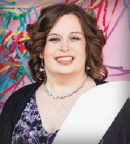In 2017, I was caring for my brother, who was suffering from respiratory failure due to complications from cerebral palsy, and working full-time as a registered nurse. I was feeling overwhelmed and exhausted all the time. I was also losing weight at an alarming rate—more than 70 pounds in just a year—which I chalked up to my busy life. It wasn’t until the symptoms became unrelenting that I began to suspect I might have cancer, but it never occurred to me it was lung cancer.
One day, as I was getting dressed for work, I started to feel ill, and my eye and arm started to twitch. I thought I was having a stroke and called 911 before I lost consciousness. In fact, I was having a seizure and not a stroke, but because the emergency responders had called in a stroke alert, when I got to the hospital I had a CT scan of my brain, which showed a mass. Additional imaging also found a mass in the upper lobe of my right lung. A biopsy of the tumor determined it was EGFR-mutant non–small cell lung cancer. As a nurse, I knew that stage IV lung cancer was incurable, but I didn’t expect to hear the medical oncologist say that I had 6 to 18 months to live.
I transferred my care to a thoracic oncologist, who refused to give me an expiration date, and instead recommended a craniotomy to remove the tumor in my brain; after that, I received three treatments of stereotactic radiosurgery to kill any additional malignant cells and then first-line therapy with the EGFR tyrosine kinase inhibitor erlotinib to treat the mass in my lung. The cancer remained stable for about a year, and then it progressed to a lymph node. Additional sequencing of the tumor found that it has the T790M gene mutation.

Along with messaging about how to reduce the risk of lung cancer, we also need to raise awareness about the importance of early detection and treatment as well as increased funding for research and survivorship.— Tiffany Fagnani, RN
Tweet this quote
My oncologist then suggested I switch to the third-generation EGFR tyrosine kinase inhibitor osimertinib and undergo five treatments of stereotactic radiation to my right upper lobe to further reduce the mass. After fearing that I had only a short time to live, I found out last summer that I’m in remission. I am relieved and still in shock.
Coping With Lung Cancer and COVID
Adding to the burden of having lung cancer is the burden of living amid a public health crisis that is also threatening my life. I worry about what will happen if I contract the coronavirus, so I’m extra cautious when I do venture outdoors. I am fully vaccinated and wear a mask whenever I’m in a public space; I’ve slowly started seeing friends who are also vaccinated and practice social distancing. I’m a very social person, and the isolation of the past 2 years has been especially difficult. It feels good to have a few moments of near normalcy again.
Living With Lung Cancer
The combination of having lung cancer and living through the worst pandemic in 100 years has made me more of a risk-taker than I was before, and I’m more willing to seize the day, which is how we all should live, and take a leap of faith into the unknown. I had always wanted to buy a house on my own but was too afraid to take on the responsibility of home ownership. Finally, in 2020, I made the decision to buy a home in a new development and moved in earlier this year.
I had no idea what I was doing during the building process or whether I was making the right decisions. However, the house turned out beautifully, and it has given me the confidence to face the future with less fear.
Becoming a patient advocate with the LUNGevity Foundation (www.lungevity.org) and being accepted into the International Association for the Study of Lung Cancer (IASLC) Supportive Training for Advocates on Research & Science (STARS) program (www.iaslc.org/patient-advocacy/stars) have also boosted my confidence about my future and the future of other survivors living with lung cancer.
Changing Public Perception
I don’t know why I got lung cancer. I have never smoked but did grow up in a coal-mining region of the country, and our house had a coal-burning stove. I don’t know whether they were contributing factors, but the cause doesn’t matter, and I’m not interested in assigning blame. There is already so much misguided stigma attached to lung cancer, which is why I’ve also become involved with the White Ribbon Project (www.thewhiteribbonproject.org), an organization that aims to change public perception of this disease. Our goal is to eliminate the erroneous belief that lung cancer survivors are to blame for their disease. The truth is that anyone can get lung cancer.
Along with messaging about how to reduce the risk of lung cancer, we also need to raise awareness about the importance of early detection and treatment as well as increased funding for research and survivorship. It is the only way to topple lung cancer as the leading cause of cancer death among men and women in the United States.
I’ll continue to do my part.
Ms. Fagnani lives in Mechanicsburg, Pennsylvania.
Editor’s Note: Columns in the Patient’s Corner are based solely on information The ASCO Post received from patients and should be considered anecdotal.

